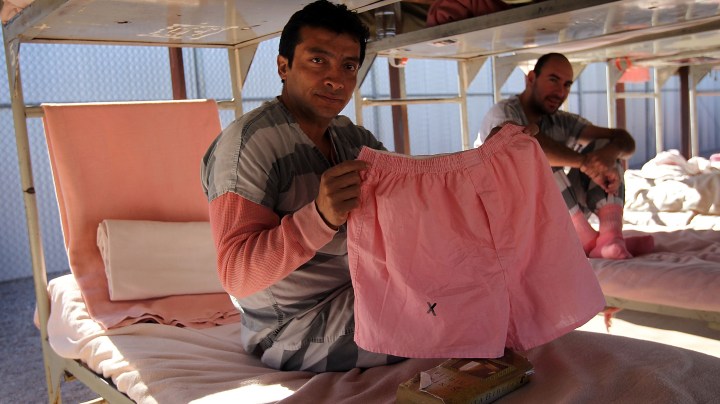After More Than 20 Years, Joe Arpaio’s Inhumane Tent City Jail Has Shuttered

Undocumented immigrant Sam Ramos, 39, shows off his jail-issued pink underwear in the Maricopa County "Tent City Jail" on April 30, 2010 in Phoenix, Arizona. Photo by John Moore/Getty Images News
Tent City Jail is no more. The seven-acre facility that former Maricopa County Sheriff Joe Arpaio built has shuttered. Back in April, the man who unseated Arpaio, Sheriff Paul Penzone, announced the that he’d close the jail that Arpaio installed in his first year as sheriff in the early 90s. The open-air jail, where inmates endured extreme weather and forcibly wore pink underwear, came under heavy scrutiny for its inhumane practices, including lack of medical care and situations meant to shame prisoners.
Arpaio’s legacy is largely tied to Tent City. When it was revealed that Tent City would close, he spoke about it the same way one may speak about losing a beloved institution to encroaching gentrification. “I’m so proud of the fact that I started this. Once you get those tents down, you will never get them up again because the city of Phoenix has to issue a permit,” he forlornly said. “Do you think the city will issue a permit when half of the city council hates the tents? They will be gone forever and that’s sad.” But this place that fills him with so much nostalgia treats people like subhumans. Arpaio himself has called it a concentration camp in the past.
Penzone previously stated that it’d take about six months for the jail to close, with the prisoners being shuffled to other facilities. Though this is a blow to Arpaio’s legacy, the former sheriff was recently pardoned by President Donald Trump after a judge convicted him of criminal contempt for racially profiling undocumented immigrants. So while this is an important step toward progress, it’s important to note that by pardoning Arpaio, the president of the United States of America has also made it clear he stands with white supremacy. And the activists who helped bring this crucial change are now focused on undoing all the damage Arpaio has caused immigrants and communities of color.